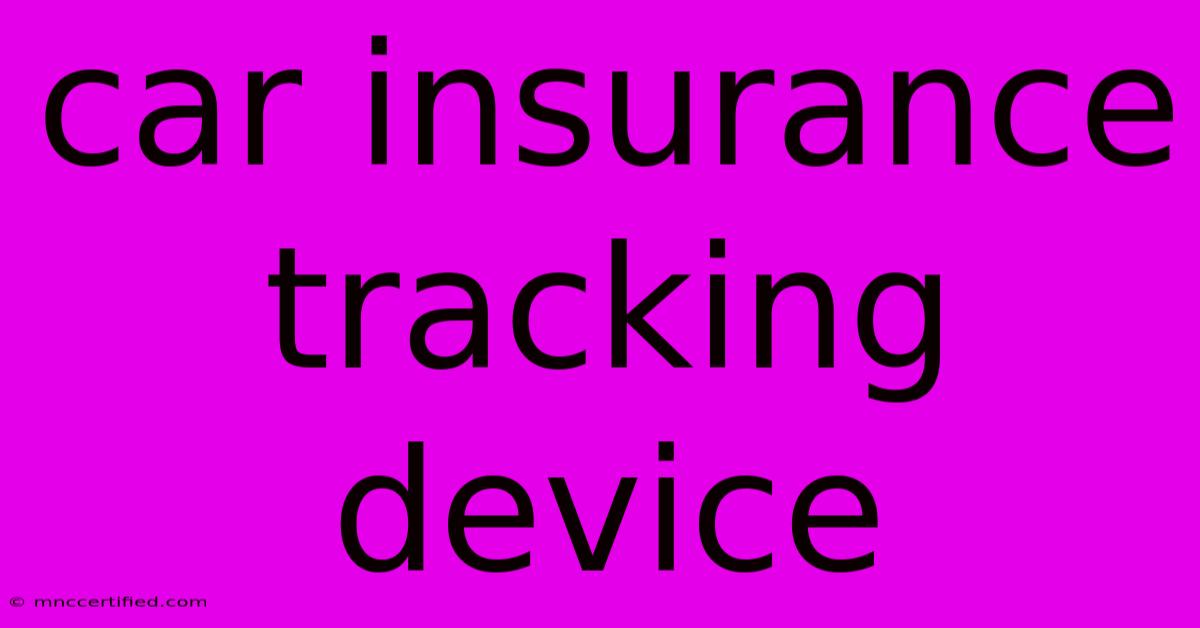Car Insurance Tracking Device

Table of Contents
Car Insurance Tracking Devices: Are They Worth It?
Are you tired of paying high car insurance premiums? Are you a safe driver looking for ways to save money? A car insurance tracking device, also known as a telematics device, might be the answer. These devices track your driving habits and can lead to significant discounts on your car insurance. But are they worth the trade-off of privacy? Let's dive into the pros and cons to help you decide.
What is a Car Insurance Tracking Device?
A car insurance tracking device is a small gadget, often plugged into your car's OBD-II port (located under your dashboard), or a separate device installed by your insurance provider. This device monitors various aspects of your driving, including:
- Speed: How fast you drive.
- Acceleration: How quickly you accelerate.
- Braking: How hard you brake.
- Mileage: The total distance you drive.
- Time of day: When you're driving.
- Location: Where you're driving (though the level of detail varies by device and insurer).
This data is then transmitted wirelessly to your insurance company, allowing them to assess your driving behavior. Based on your driving score, you can earn discounts on your premiums.
The Benefits of Using a Car Insurance Tracking Device
The primary advantage of using a car insurance tracking device is the potential for substantial savings. Safe drivers who consistently demonstrate responsible driving habits can receive significant discounts, sometimes up to 40% or more, on their annual premiums. This makes it a financially attractive option for many.
Other benefits include:
- Improved Driving Habits: Knowing your driving is being monitored can encourage safer driving practices, benefiting both you and other drivers on the road.
- Increased Awareness: The feedback you receive on your driving can highlight areas for improvement, helping you become a more conscious and safer driver.
- Personalized Feedback: Many programs offer detailed reports and feedback on your driving, providing insights into your strengths and weaknesses.
- Potential for Rewards Programs: Some insurers offer additional rewards or incentives beyond just discounts for maintaining a good driving score.
The Drawbacks of Using a Car Insurance Tracking Device
While the potential savings are tempting, it's crucial to consider the drawbacks:
- Privacy Concerns: The constant monitoring of your driving habits raises privacy concerns for some individuals. The data collected includes your location and driving patterns, potentially revealing personal information. Carefully review your insurer's privacy policy before enrolling.
- Device Installation and Maintenance: While most devices are relatively easy to install, there can still be some technical hurdles. Problems with the device itself can lead to frustration and require troubleshooting.
- Data Accuracy: The accuracy of the data collected can vary depending on the device and environmental factors. Incorrect data could unfairly impact your driving score.
- Lack of Flexibility: Some programs have restrictions on the types of vehicles or the amount of driving you can do while still qualifying for discounts.
Choosing the Right Car Insurance Tracking Device and Provider
When selecting a car insurance tracking device program, consider the following:
- Discount Percentage: Compare the potential savings offered by different insurers.
- Privacy Policy: Carefully review the insurer's privacy policy to understand how your data will be used and protected.
- Device Features: Consider the features offered by the device, such as the type of feedback provided and the level of detail in the reports.
- Customer Reviews: Read online reviews from other users to gain insights into their experiences with the program.
- Compatibility: Ensure the device is compatible with your vehicle.
Conclusion: Is it Right for You?
Car insurance tracking devices offer a compelling proposition for safe drivers seeking significant savings. The potential for substantial discounts is undeniable. However, privacy concerns and potential technical issues are valid considerations. Weigh the pros and cons carefully, research different providers, and choose a program that aligns with your values and driving habits. Ultimately, the decision of whether or not to use a car insurance tracking device is a personal one.

Thank you for visiting our website wich cover about Car Insurance Tracking Device. We hope the information provided has been useful to you. Feel free to contact us if you have any questions or need further assistance. See you next time and dont miss to bookmark.
Featured Posts
-
Coventry B S Fixed Rate Bonds
Nov 28, 2024
-
Your Guide To Sc Grocery Shopping
Nov 28, 2024
-
Players Urged Recheck Euro Millions Tickets
Nov 28, 2024
-
Stellantis Uk Plant Shutdown Confirmed
Nov 28, 2024
-
Champions League Result Liverpool Madrid
Nov 28, 2024